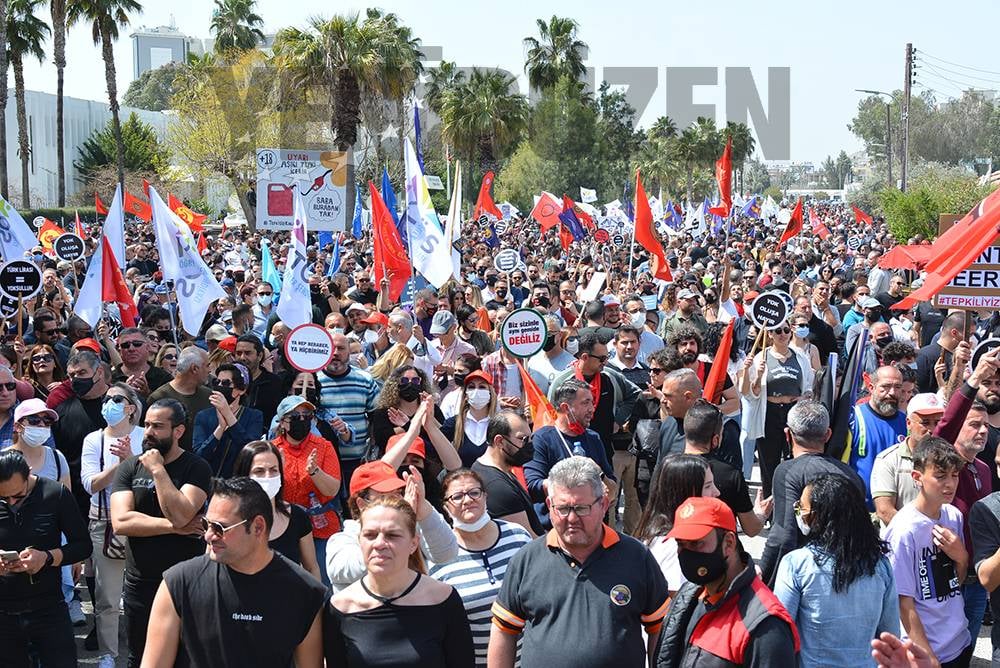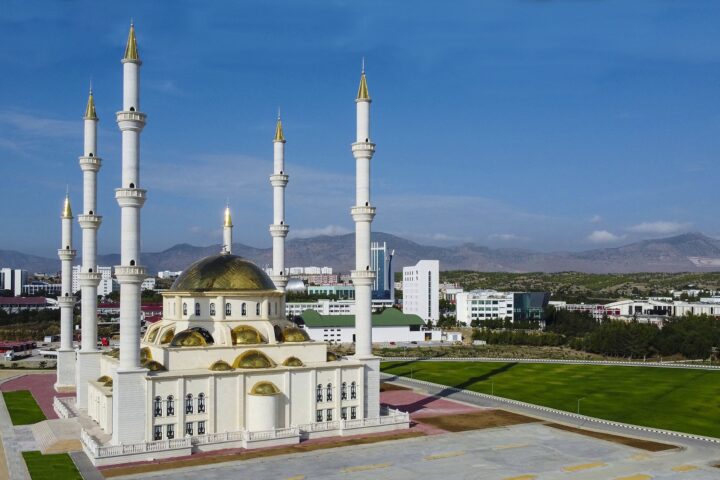Thousands of Turkish Cypriots have taken to the streets, spurred by soaring inflation that has left many struggling to make ends meet, with demonstrators linking the financial demise to the north’s political agenda.
Last week, a general strike and demonstration organised by trade unions and left parties protested against policies leading to ‘socio-economic poverty’ promoted by the ruling coalition in the north and backed by Ankara.
Demonstrators chanted “No to poverty”, “Unity, Struggle, Solidarity”, and “We shall be victorious by resisting”.
It is thought to be the biggest march in recent years and reminiscent of the mass mobilisations in 2003-2004 during the UN-backed Annan Plan.
The protests come after the Turkish lira went into freefall in recent months.
Mine Atli, the newly elected head of the Communal Democracy Party (TDP), actively involved in recent demonstrations, told the Financial Mirror that Turkish Cypriots are now paying a hefty price for the breakaway state’s political agenda of increased financial and political dependence on Turkey.
TDP, once led by former Turkish Cypriot leader Mustafa Akinci, has shrunk, going from 10% of the Turkish Cypriot vote to around 4%, but still carries significant influence.
“We did not get to this state overnight. This is the result of the policies taken by ruling powers in the north over the past 40 years.
“We have grown to be entirely dependent on Turkey, and as a result, any crisis striking Turkey is felt multiple times more in the north.
“We have been kept from investing in our own resources and developing our own mechanisms,” said Atli.
She argued that Ankara-backed policies had kept Turkish Cypriots from investing in energy projects and upgrades, literally leaving them in the dark due to frequent power cuts and having to pay fat bills for electricity.
A few months ago, Atli said a monthly electricity bill for a four-member family was around 500 Turkish Lira; families are now paying triple that amount.
“Our salaries are in Turkish lira, but everything else is indexed to a foreign currency.
“Buying or renting a home is indexed to the GBP.
“All our imports from essential goods to vehicles are indexed to a foreign currency, which means that with the depreciation of the Turkish lira, our purchasing power has shrunk to nothing,” said Atli.
The currency was 16 against the euro when volatility returned in late February as the tensions between Moscow and Kyiv rose.
In the past six months, the lira has shed 55% of its value against the euro.
Doomed
“This is what we are protesting against.
“But we need to be clear. Without a solution to the Cyprus problem which will allow us to establish transparent institutions and make use of our resources, the Turkish Cypriot community is doomed to be pushed further into the arms of Turkey.”
Atli said the two sides need to come together for Confidence Building Measures, as without them, the last glimmer of hope for a solution will be lost.
“If this doesn’t happen, Turkish Cypriots will turn to Turkey for more help, which will not come without its strings attached.”
Professor of Political Science at the Eastern Mediterranean University in the north, Ahmet Sozen, told the Financial Mirror the situation was “explosive”, with the ruling coalition sitting on shaky ground.
“The ruling coalition is walking on a tight rope here, as the rate of impoverishment in the north has reached a record high.
“Turkey’s authorities recently announced a 61.4% YoY inflation, while the north’s inflation is more than 100%, despite officials talking about a Yoy 83.94% inflation in March”.
Sozen argues that due to Turkish Cypriot’s overdependence on imported goods indexed to foreign currencies, “the effect of what happens to the Turkish economy is multiplied by the time it reaches the island”.
He explained that Turkish Cypriot families have difficulty making ends meet despite a 40% increase in civil servants’ wages and a 50% increase in the minimum wage.
The net minimum wage in the north is 6,090 TL (€378), of which a family of four must spend a minimum of 2,000 toward renting a home, said a survey carried out by the civil servants union KTAMS.
Another 2,000 goes on fuel, 1,000 goes for heating and cooling purposes, while another 1,000 goes towards paying electricity bills.
KTAMS said when feeding, and clothing needs are added to the equation, a family living on a minimum wage will find itself 1,000 TL (€62) under the poverty line.
Sozen believes that discontent towards the ruling coalition has grown after it introduced an unpopular tax on alcohol, which it was forced to retract after demonstrations, mainly by young people.
“Looking at decisions taken by the coalition, one will immediately identify the lack of coherence and logic. Planning seems to be governed by a political agenda.
“This has further widened the gap between the ultra-rich and the poorer sections of society.
“About ten years ago, the average earnings per capita were around $20,000 per year; now it is below €13,000 per capita,” said Sozen.
He agreed that Turkish Cypriots would be better off if the Cyprus problem was resolved and the north part of the European Union.
“This is a survival issue, with the community focusing on finding ways to resolve it.
He said that supporting a two-state solution was not in the interest of Turkish Cypriots, as such policies only magnify the north’s isolation.
“Even countries close to Turkey are turned off by the hardliners’ insistence on a two-state solution.
“Being an unrecognised entity, with policies not supported by the international community, will only worsen the situation,” said Sozen.










